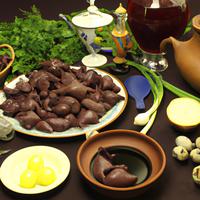
1 serving (100 grams) contains 167 calories, 26.0 grams of protein, 4.8 grams of fat, and 0.9 grams of carbohydrates.

Log this food in SnapCalorie

Nutrition Information
Calories |
417.5 | ||
|---|---|---|---|
% Daily Value* |
|||
| Total Fat | 12 g | 15% | |
| Saturated Fat | 4 g | 20% | |
| Polyunsaturated Fat | 0 g | ||
| Cholesterol | 1410 mg | 470% | |
| Sodium | 177.5 mg | 7% | |
| Total Carbohydrates | 2.2 g | 0% | |
| Dietary Fiber | 0 g | 0% | |
| Sugars | 0 g | ||
| protein | 65 g | 130% | |
| Vitamin D | 0 mcg | 0% | |
| Calcium | 27.5 mg | 2% | |
| Iron | 22.5 mg | 125% | |
| Potassium | 787.5 mg | 16% | |
* Percent Daily Values are based on a 2,000 calorie diet. Your daily values may be higher or lower depending on your calorie needs.
Food Attributes
Source of Calories
About Boiled chicken liver
Boiled chicken liver is a nutrient-dense organ meat widely used in various cuisines, including French, Eastern European, and Asian dishes. Rich in essential vitamins and minerals, it is a powerhouse of iron, vitamin A, and B vitamins, particularly B12, which supports red blood cell production and energy metabolism. It is also an excellent source of high-quality protein, making it ideal for muscle growth and repair. Despite its health benefits, chicken liver should be consumed in moderation due to its high cholesterol and vitamin A content, which may be excessive if overeaten. Low in carbohydrates and naturally tender when boiled, it’s a staple in traditional recipes such as pâtés or as a standalone dish paired with herbs and spices. This inexpensive, versatile ingredient is favored for its robust nutritional profile and ability to adapt to a variety of culinary styles.



